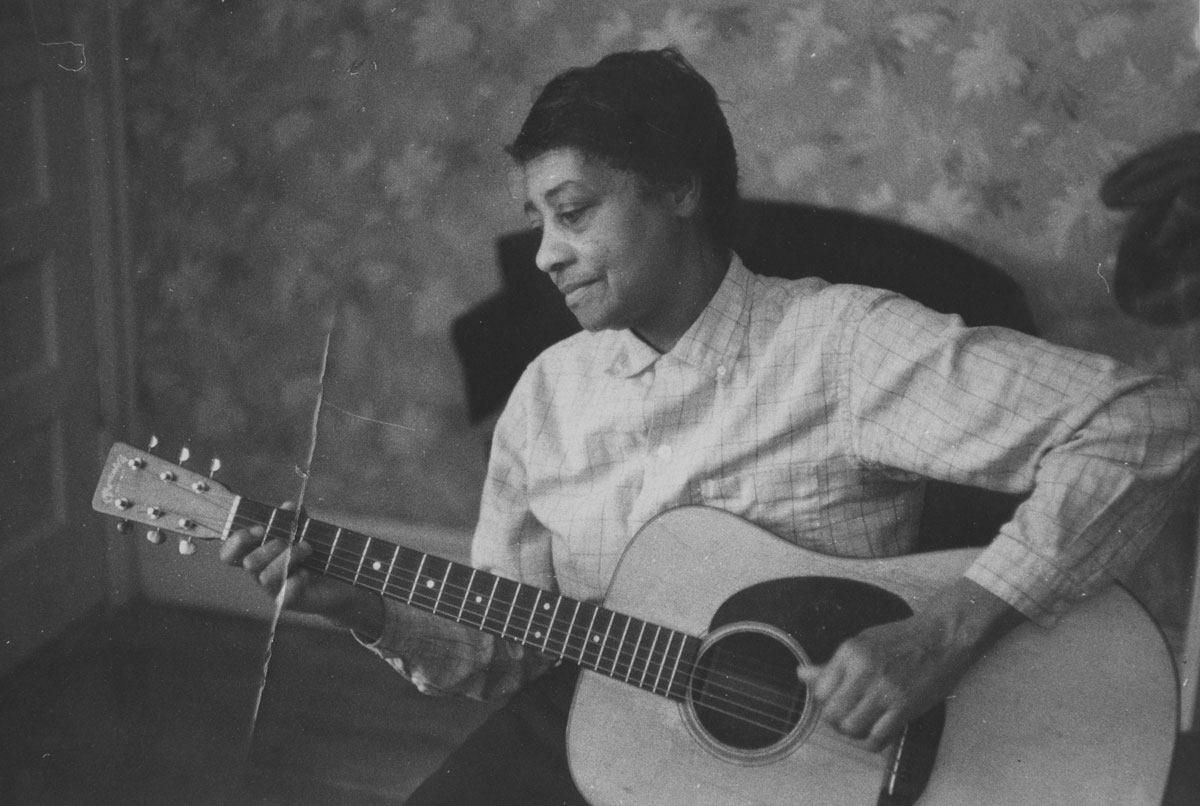Cotten, Elizabeth Nevills [Libba]
By Michael Hill
Research Branch, NC Office of Archives and History, 2009
https://www.dncr.nc.gov/about-us/history/division-historical-resources/nc-highway-historical-marker-program
5 Jan 1893 - 29 Jun 1987
 Libba Cotten composed, recorded “Freight Train” (1958). Key figure, 1960s folk revival
Libba Cotten composed, recorded “Freight Train” (1958). Key figure, 1960s folk revival
Elizabeth Nevills Cotten taught the world “Freight Train,” “Shake Sugaree,” and a host of other songs. Her “parlor ragtime” style was no less elegant for the guitar being turned upside down and the thumb and finger roles being reversed.
The 1900 census indicates that she was born in 1893 and originally called Ella by her family. The Nevills lived just west of Chapel Hill, an area that would eventually be incorporated as Carrboro. She was born and grew up near the railroad tracks on what is now called Lloyd Street. She wrote “Freight Train” at age 11.
Her early biography reads much like those of most of the people around her: hard work punctuated by frolics, music, marriage, church and family. Her early married life entailed moving among North Carolina, New York,, and Washington, D.C., caring for her mechanic husband Frank and her daughter Lillie. Once Lillie was married, she and Frank divorced and she took up life in Washington with her daughter.
Joining the church had necessitated all but giving up music. Mostly she did domestic work, but clerking at a department store fortuitously led to her employment by composer and folklorist Ruth Crawford Seeger. It was while working for Seeger's family that she idly picked up a guitar and revealed herself to be precisely the kind of native player they held up as an ideal. By then she was over sixty years old.
Seeger’s son Mike made a project of recording her songs, releasing a Folkways record of them just in time for it to receive great acclaim as a supporting document for the folk revival of the early sixties. Thousands of middle class youngsters learned “Freight Train” as their first foray into finger picking, and from there went on to study the deeper traditional music millions of Appalachian and African American musicians played largely for their own amusement.
Libba Cotten ceased domestic work and spent the rest of her life as a traveling entertainer. She performed at the 1963 Philadelphia Folk Festival and the 1964 Newport Folk Festival. She would be honored as a National Heritage Fellow and won a Grammy at the age of ninety-one in 1984.
Despite being played left handed and upside down, her music became popular because it was simple for beginning players to execute, and because it was exemplary of fundamental Southern musical ideas that ramified into blues, country, ragtime, early jazz, and swing. She died on June 29, 1987, and is buried in Syracuse, New York.
References:
"Elizabeth Cotten 1893-1987." N.C. Highway Historical Marker G-129, N.C. Office of Archives & History. http://ncmarkers.com/Markers.aspx?MarkerId=G-129
Bruce Bastin, Red River Blues (1986)
Phil Hood, Artists of American Folk Music (1986)
Lawrence Cohn, Nothing But the Blues: The Music and the Musicians (1993)
Cecilia Conway, African Banjo Echoes in Appalachia (1995)
Michael Weinberg, Elizabeth's Song (2002)
John Cohen and Greil Marcus, There is No Eye: John Cohen Photographs (2001)
Mike Seeger, liner notes for Freight Train and Other North Carolina Folk Songs (Smithsonian Folkways, 1989)
9 March 2017 | Hill, Michael